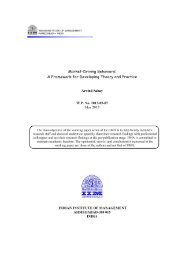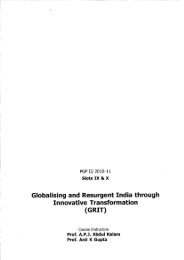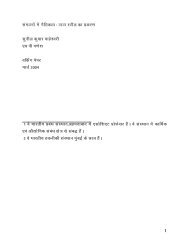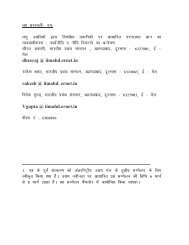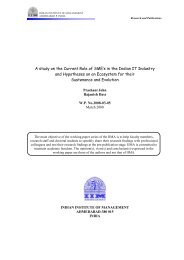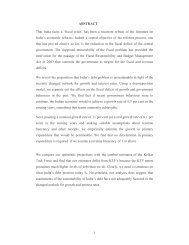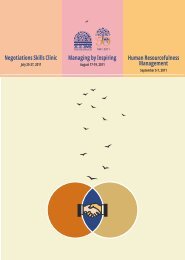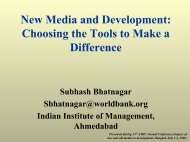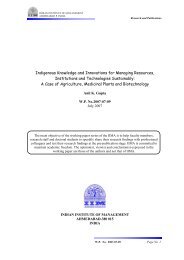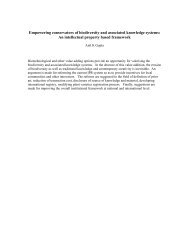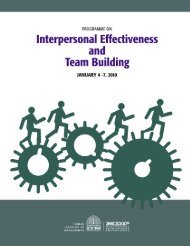related paper - Indian Institute of Management, Ahmedabad
related paper - Indian Institute of Management, Ahmedabad
related paper - Indian Institute of Management, Ahmedabad
Create successful ePaper yourself
Turn your PDF publications into a flip-book with our unique Google optimized e-Paper software.
Mainstreaming the Practices <strong>of</strong> Innovative Teachers<br />
Managing Decentralized Pr<strong>of</strong>essional Development in Public Schooling<br />
Vijaya Sherry Chand, <strong>Indian</strong> <strong>Institute</strong> <strong>of</strong> <strong>Management</strong>, India<br />
Abstract: The formal state-run (public) schooling system in developing countries depends on a centrally-driven approach<br />
to the pr<strong>of</strong>essional development <strong>of</strong> its teacher workforce. The culture which underpins this approach is defined by hierarchy,<br />
centralized control <strong>of</strong> training delivery, an ethos which facilitates a downward ‘cascading’ transmission <strong>of</strong> expertise by<br />
knowledgeable authorities, and an assumed uniformity <strong>of</strong> training needs. This culture hinders the abstraction and processing<br />
<strong>of</strong> relevant and effective practices from the grassroots, resulting in the system’s inability to learn from the strengths within.<br />
An alternative culture that values peer-learning, sharing <strong>of</strong> experiences, validation <strong>of</strong> outstanding practices and development<br />
<strong>of</strong> learning material for use by decentralized pr<strong>of</strong>essional forums will promote key principles like self-learning, applying<br />
external practices to one’s own problems and monitoring self-development. This <strong>paper</strong> has outlined an “educational innovation<br />
bank” (EI Bank) initiative, drawing on processual theories <strong>of</strong> innovation that identify specific types <strong>of</strong> networks for<br />
the three “episodes” <strong>of</strong> innovation: design and development, diffusion and implementation, and the <strong>related</strong> knowledge<br />
transformation that is called for. The establishment <strong>of</strong> the EI Bank combines the social construction <strong>of</strong> knowledge by decentralized<br />
networks with knowledge objectification in the diffusion episode, through a process <strong>of</strong> screening and validating innovations<br />
and converting them into user-friendly products like case studies, a curriculum module and an open-access,<br />
searchable database <strong>of</strong> teachers’ practices. The use <strong>of</strong> the EI Bank calls for a return to local user-networks to adapt the<br />
objectified ideas in new contexts. Such an alternative approach demands that educational administrators perform three<br />
tasks—develop a learner-focused perspective, convert validated local knowledge into ‘products’ through appropriate networks,<br />
and undertake “policy entrepreneurship”—if they are to develop a culture <strong>of</strong> decentralized pr<strong>of</strong>essional development.<br />
Keywords: Culture <strong>of</strong> Decentralization, Pr<strong>of</strong>essional Development, Educational Innovations<br />
THE FORMAL STATE-RUN (public)<br />
schooling system in developing countries<br />
depends on a centrally-driven approach to<br />
the pr<strong>of</strong>essional development <strong>of</strong> its teacher<br />
workforce. The culture which underpins this approach<br />
is defined by hierarchy, centralized control<br />
<strong>of</strong> training delivery, an ethos which facilitates a<br />
downward ‘cascading’ transmission <strong>of</strong> expertise by<br />
knowledgeable authorities, and an assumed uniformity<br />
<strong>of</strong> training needs. This culture hinders the abstraction<br />
and processing <strong>of</strong> relevant and effective practices<br />
from the grassroots, resulting in the system’s inability<br />
to learn from the strengths within. An alternative<br />
culture that values peer-learning, sharing <strong>of</strong> experiences,<br />
validation <strong>of</strong> outstanding practices and development<br />
<strong>of</strong> learning material for use by decentralized<br />
pr<strong>of</strong>essional forums will promote key principles like<br />
self-learning, applying external practices to one’s<br />
own problems and monitoring self-development.<br />
This <strong>paper</strong> has outlined an “educational innovation<br />
bank” (EI Bank) initiative, drawing on processual<br />
theories <strong>of</strong> innovation that identify specific types <strong>of</strong><br />
networks for the three “episodes” <strong>of</strong> innovation:<br />
design and development, diffusion and implementation,<br />
and the <strong>related</strong> knowledge transformation that<br />
is called for. The establishment <strong>of</strong> the EI Bank<br />
combines the social construction <strong>of</strong> knowledge by<br />
decentralized networks with knowledge objectification<br />
in the diffusion episode, through a process <strong>of</strong><br />
screening and validating innovations and converting<br />
them into user-friendly products like case studies, a<br />
curriculum module and an open-access, searchable<br />
database <strong>of</strong> teachers’ practices. The use <strong>of</strong> the EI<br />
Bank calls for a return to local user-networks to adapt<br />
the objectified ideas in new contexts. Such an alternative<br />
approach demands that educational administrators<br />
perform three tasks—develop a learner-focused<br />
perspective, convert validated local knowledge into<br />
‘products’ through appropriate networks, and undertake<br />
“policy entrepreneurship”—if they are to develop<br />
a culture <strong>of</strong> decentralized pr<strong>of</strong>essional development.<br />
The context for this <strong>paper</strong> is the pr<strong>of</strong>essional development<br />
<strong>of</strong> teachers working in large formal staterun<br />
(public) schooling systems in developing countries<br />
like India. The approach to in-service teacher<br />
development in such systems has usually relied on<br />
top-down hierarchical delivery <strong>of</strong> training inputs in<br />
a ‘cascade’ mode. Some key assumptions made by<br />
such an approach are an assumed uniformity <strong>of</strong><br />
training needs and a ‘deficit’ reduction model <strong>of</strong> development<br />
which does not recognize the knowledge<br />
and practices <strong>of</strong> the teachers themselves. The cascade<br />
model—in spite <strong>of</strong> its limitations (Shaeffer 1993),<br />
INTERNATIONAL JOURNAL OF KNOWLEDGE, CULTURE AND CHANGE MANAGEMENT, VOLUME 6, NUMBER 5, 2006<br />
http://www.<strong>Management</strong>-Journal.com, ISSN 1447-9524<br />
© Common Ground, Vijaya Sherry Chand, All Rights Reserved, Permissions: cg-support@commongroundpublishing.com



